
- Homepage
- Author
- Aleister Crowley (10)
- Anonymous (12)
- C H Spurgeon (10)
- Charles Dickens (25)
- Edgar Allan Poe (14)
- God (22)
- John Dee (21)
- L. Frank Baum (10)
- Lewis Carroll (41)
- Louisa May Alcott (10)
- Maria Parloa (9)
- Mark Twain (8)
- Mixed Authors (11)
- Multiple (8)
- Rudyard Kipling (21)
- Selected (8)
- Unknown (32)
- Various (35)
- Walter Scott (8)
- William Shakespeare (28)
- ... (4993)
- Binding
- Cloth (51)
- Disbound (3)
- Fine Binding (203)
- Framed (2)
- Good (8)
- Hardback (114)
- Hardcover (1095)
- Hardcover / (4)
- Hardcover W / Jacket (3)
- Leather (495)
- Leather / Hardcover (4)
- Manuscript (26)
- Manuscript, Unbound (2)
- Original Copy (99)
- Paperback (6)
- Pigskin (2)
- Softcover (3)
- Softcover, Wraps (86)
- Spiral (2)
- Vellum (54)
- ... (3074)
- Language
- Publisher
- Antiquity (47)
- Cassell (7)
- Collector Books (12)
- David Mckay (6)
- Doubleday (6)
- Estes And Lauriat (9)
- Frank Leslie (6)
- Funk & Wagnalls (9)
- Grosset & Dunlap (22)
- Harper & Brothers (13)
- Lille, Blocquel (7)
- Macmillan (14)
- Macmillan And Co. (12)
- Mcloughlin Bros (5)
- Passmore & Alabaster (6)
- Selected (6)
- The Century Company (8)
- Transylvania Amira (7)
- Unknown (12)
- Various (17)
- ... (5105)
- Region
- Subject
- Americana (63)
- Art & Photography (57)
- Children's (177)
- Classic Literature (12)
- Cooking (44)
- Exploration & Travel (51)
- History (273)
- Illustrated (31)
- Law & Government (19)
- Literature (10)
- Literature & Fiction (288)
- Military & War (17)
- Outdoor & Nature (13)
- Performing Arts (10)
- Philosophy (15)
- Poetry (11)
- Reference (49)
- Religion, Bibles (17)
- Science & Medicine (111)
- Sports & Recreation (12)
- ... (4056)
Rare antique old leather book 1779 Aesopian Fables Phaedrus english latin
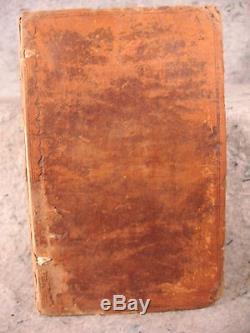



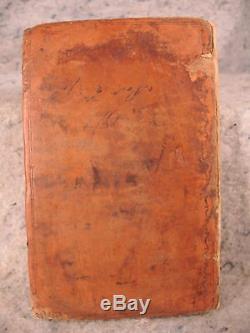
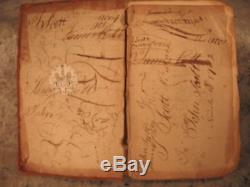
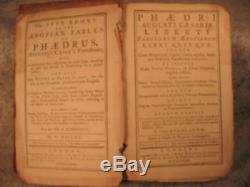
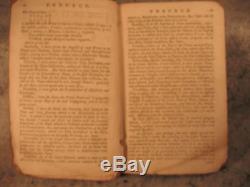
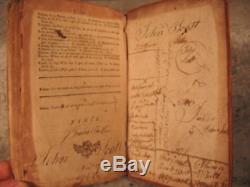
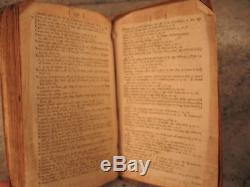
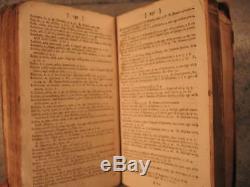


The Five Books of the Aesopian Fables of Phaedrus, Augustus Caesars Freedman, with a numerical key adjoining to each line, directing to take the words in construing in a proper order and also the notes of Peter Danet for the use of schools by N. In London during the year MDCCLXXIX (1779 - 14th edition).
A Construing and Parsing INDEX to Phaedrus Fables, being all the words in them digested into a alphabetical order and the english set to each word together with a grammatical praxis upon them. Two title pages one in english and the other in latin. Text in latin; prefaces, annotations & notes in english. Leather binding In poor condition, no spine covering. Worn , scuffed, covers almost detached. Lot of interesting writing /signatures on front endpaper /blank page by orginal owner James Scott. With a date of 1782. These pages and title page are detached.Pages have lot of wear on edges, corners, some damaged with torn off corners, lots of folded corners. Various degrees of spotting, yellowing, some torn pages. 4 pages are in very poor condition with tears and pieces of the page missing with loss of some of the text. And lived in the reigns of.
He is recognized as the first writer to Latinize entire books of fables, retelling in iambic metre the Greek prose. According to his own statement (prologue to book III), he was born on the. But he seems to have been brought to. At an early age, since he mentions reading a verse of.
As a boy in school. According to the heading of the chief manuscript he was a. He incurred the wrath of. By some supposed allusions in his.
And was brought to trial and punished. We learn this from the prologue to the third book, which is dedicated to Eutychus, who has been identified with the famous charioteer and favorite of Gaius. The fourth book is dedicated to Particulo, who seems to have dabbled in literature.
The dates of their publication are unknown, but. Writing between AD 41 and 43, knows nothing of Phaedrus, and it is probable that he had not yet published anything. To the fables attributed to. The verses are interspersed with anecdotes drawn from daily life, history and mythology.Is typified by a particular use of abstract concepts that belies an awareness of the literary canon, especially Augustan works. And directly inspired a modern imitator. Who imitated some of his verses, and by. Must have read him, for he imitates one of his lines. The first edition of the five books of Phaedrus was published by.
In 1596 from a manuscript now in the possession of the Marquis of Rosanbo. Near the beginning of the 18th century, a manuscript of.
Containing sixty-four fables of Phaedrus, of which some thirty were previously unknown. These new fables were first published in. By Cassitto in 1808, and afterwards (much more correctly) by Jannehli in 1809. Both editions were superseded by the discovery of a much better preserved manuscript of Perotti in the. For some time the authenticity of these new fables was disputed, but they are now generally accepted as genuine fables of Phaedrus. They do not form a sixth book, for we know from Avianus that Phaedrus wrote only five books, but it is impossible to assign them to their original places in the five books. They are usually printed as an appendix. In the Middle Ages Phaedrus exercised a considerable influence through the prose and verse versions of his fables, which were current, even though his own works (and even his name) were apparently forgotten. Of the prose versions, the oldest existing one seems to be that known as the. So called because it was first edited by Nilant at.In 1709 from a manuscript of the 13th century. It follows the text of Phaedrus so closely that it was probably made directly from it.
Of the sixty-seven fables which it contains, thirty are derived from lost fables of Phaedrus. The largest, oldest known and most influential of the prose versions of Phaedrus is that which bears the name of. It contains eighty-three fables, is as old as the 10th century, and seems to have been based on a still earlier prose version, which, under the name of "Aesop, " and addressed to one Rufus, may have been made in the. About this Romulus nothing is known. The collection of fables in the Weissenburg (now Wolfenbüttel) manuscript is based on the same version as Romulus. These three prose versions contain in all one hundred distinct fables, of which fifty-six are derived from the existing fables and the remaining forty-four presumably from lost fables of Phaedrus. Have tried to restore these lost fables by versifying the prose versions.The prose Romulus collection became the source from which, during the second half of the Middle Ages, almost all the collections of Latin fables in prose and verse were wholly or partially drawn. A version of the first three books of Romulus in. Verse, possibly made in around the 12th century, was one of the most highly influential texts in medieval Europe. Referred to variously (among other titles) as the.
Or elegiac Romulus , it was a common teaching text for Latin and enjoyed a wide popularity well into the. Its unknown author is usually referred to as "Anonynius Neveleti", although "he" has sometimes been identified with known figures such as. Another version of Romulus in Latin elegiacs was made by. Interpretive vernacular "translations" of the elegiac Romulus were very common in Europe in the Middle Ages. Among the collections partly derived from it, one of the most well-known is probably that in. A collection of fables in Latin prose based partly on Romulus and given a strong medieval and clerical tinge was made c. Wrote a poetical version of Romulus in. However, the most developed poetic derivation from the elegiac Romulus text, combined with other genres, was made in. In the late 15th century by.Is the only surviving example known to have made high art of the genre. Since Pithou's edition in 1596 Phaedrus has been often edited and translated; among the editions may be mentioned those of Burmann (1718 and 1727).
Müller (1877), Rica (1885), and above all that of. Please look at photos to help determine condition. PLEASE TAKE A LOOK AT MY COLLECTION OF OTHER COOL STUFF I HAVE LISTED. Check out my other items.
Be sure to add me to your favorites list. Add a map to your own listings. The item "Rare antique old leather book 1779 Aesopian Fables Phaedrus english latin" is in sale since Monday, May 11, 2015.This item is in the category "Books\Antiquarian & Collectible". The seller is "scottalbertson" and is located in Nellysford, Virginia. This item can be shipped worldwide.
- Binding: Leather
- Subject: Literature & Fiction
- Topic: old school book
- Year Printed: 1779

